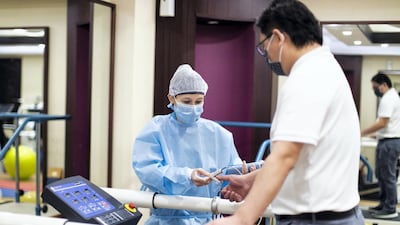More than a year after recovering from Covid-19, a distorted sense of smell persists for Dr Tamer Saafan, 43.
In September 2020, the consultant surgeon from Dubai's Saudi-German Hospital contracted coronavirus.
With just mild symptoms and a fever lasting two days, he recovered quickly and got the all-clear two weeks later.
Saudi-German Hospital
But then something strange happened. He noticed that his shower gel smelt bad. Then other scents, including his wife's perfume, hand soap and air fresheners, all began to smell putrid.
“They all smelt bad – like sewage. Then I tried other brands of perfume, the majority of them smelt bad,” he said.
Oud, the popular Arab fragrance used in everything from malls to laundry liquid, was particularly malodorous, he said.
Now, 15 months later, he has learnt to adapt to it. He even has to ask his wife to check whether clothes are clean and smell fresh.
“I used to get upset at first and asked my family not wear any perfume,” Dr Saafan said.
“Now if something smells bad, I know it doesn’t, in fact.”
Long Covid is a mystery for scientists – particularly who gets it and why. Studies show between 25 per cent and 50 per cent of people have some form of lingering symptoms, although most are mild.
Dr Saafan said he is fortunate that his ailment is merely olfactory. Others suffer crippling fatigue. There are even hospital units dedicated to helping once severely ill Covid patients to get back on their feet.
“I read and researched the long-term effects of the virus and saw that many people across the world suffered loss of taste or smell,” he said.
He found nothing about when it will return to normal but he is hopeful it eventually will.
“I found that there are vitamins that can help fix the problem but I honestly don’t have time to try them with my tight schedule,” he said.
“It's fine now, I even returned to wearing perfume myself – although to me it smells pretty bad.”








